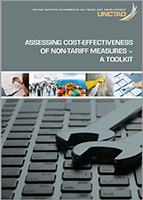
Non-tariff measures (NTMs) are policy measures, other than ordinary customs tariffs, that can potentially have an economic effect on international trade in goods by changing quantities traded, or prices or both. Most NTMs are designed to achieve public policy objectives, such as food safety, consumer protection, or protection of the environment.
Poorly designed and inefficiently implemented NTMs can create a significant burden for the private sector. However, while NTMs can be costly and trade restrictive, they can be necessary for achieving other social or development goals. Thus, there is a need to strike a careful balance between costs and benefits.
The Non-tariff measures cost-effectiveness toolkit is designed to provide policy makers a framework and the tools to review NTMs. The toolkit is designed on 3 pillars: design, implementation and compliance. The design pillar evaluates how suitable the NTM is for meeting the stated objectives. Implementation assesses the efficacy of procedures and costs of implementing the NTM. And compliance measures how burdensome an NTM is on the private sector.
The findings from the toolkit enable users to generate policy options towards implementing well-designed NTMs that meet economic and non-economic policy objectives.
The toolkit follows a five-step approach:
- Product selection to identify imported intermediate inputs within a value chain of interest and mapping the applicable NTMs using the UNCTAD Trains Database.
- Stakeholder identification of the government agencies responsible for designing and enforcing the NTMs under consideration; the regulated firms; as well as other relevant government agencies.
- Stakeholder engagement through surveys, focus group discussions, in-depth interviews and detailed compliance and implementation cost assessment. Interview and survey guidelines are provided to facilitate a comprehensive analysis of NTMs.
- Stakeholder input analysis to identify issues and challenges regarding compliance, design and implementation. Insights drawn may be substantive or procedural.
- Generating policy options to address the identified problems to drive an NTM reform agenda.
In a nutshell, the toolkit provides a systematic approach and easy-to-use tools to review NTMs from multiple angles, analyze their costs and benefits, and lead to policy improvements.


